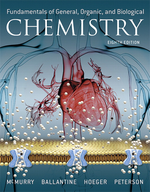?Hydrogen chloride can be made from the reaction of chlorine and
Chapter 7, Problem 7.60(choose chapter or problem)
Hydrogen chloride can be made from the reaction of chlorine and hydrogen:
\(\mathrm{Cl}_{2}(g)+\mathrm{H}_{2}(\mathrm{~g}) \longrightarrow 2 \mathrm{ICl}(g)\)
For this reaction, K=26 \(\times 10^{33} \text { and } \Delta H=-184 \mathrm{~kJ} / \mathrm{mol}\).
(a) Is the reaction endothermic or exothermic?
(b) Are the reactants or the products favored at equilibrium?
(c) Explain the effect on the equilibrium of
(1) Increasing pressure by decreasing volume
(2) Increasing the concentration of HCl(g)
(3) Decreasing the concentration of \(\mathrm{Cl}_{2}(\mathrm{~g})\)
(4) Increasing the concentration of \(\mathrm{H}_{2}(g)\)
(5) Adding a catalyst
Text Transcription:
Cl_2(g)+H_2~g longrightarrow 2 Cl(g)
10^33 Delta H=-184~kJ mol
Cl_2 ~g
H_2(g)
Unfortunately, we don't have that question answered yet. But you can get it answered in just 5 hours by Logging in or Becoming a subscriber.
Becoming a subscriber
Or look for another answer
